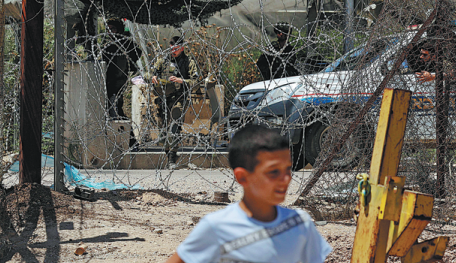2 states still best fix in Middle East
By JAN YUMUL in Hong Kong | China Daily Global | Updated: 2022-06-21 09:05
Solution the most rational way out of Israel-Palestine conflict, experts say

A two-state solution, with the cooperation of the international community, remains the most rational way forward for Israelis and Palestinians, experts said, after a United Nations-backed inquiry blamed Israel for the protracted conflict.
Haydar Oruc, a former researcher at the Center for Middle Eastern Studies in Turkey, said that establishing a two-state solution is harder now, but not impossible.
"The first condition of reviving this solution is ending the occupation and giving their land to Palestinians to found their sovereign and independent state," said Oruc, adding that the international community should come together so that both sides make peace under equal and fair conditions.
The United Nations Independent International Commission of Inquiry on the Occupied Palestinian Territory, including East Jerusalem, and in Israel, said in a report issued on June 7, that Israel's occupation of Palestinian territory and discrimination against Palestinians are the key root causes of the recurrent tensions and instability in the region. Oruc said that no state can ignore international law.
"There is no rational plan other than a two-state solution. Because the alternative plan called the one-state solution is full of contradictions," said Oruc, adding that the two-state solution remains "a single rational formula".
The commission's report was presented to the 50th session of the UN Human Rights Council in Geneva on June 13.
Ayman Yousef, a professor of international relations at the Arab American University in Jenin in the West Bank, believes the findings of the UN-backed inquiry may not have significance for the peace process.
He said "many reports and many decisions and many statements "have already been issued by the UN Security Council or in the UN's general assemblies, but "they have not been implemented on the ground".
The findings stated that past recommendations have "overwhelmingly not been implemented", he said.
Yousef notes that Israel "is now building a new strategy in dealing with the Palestinians and the Palestine question", and that this strategy relies on "putting more emphasis on the economic component, economic factors, and normalizing with Arab countries".
"Therefore, I feel economic peace and normalization of (relations with) the Arab countries… might be the alternative project to any political solution to the Palestine question," Yousef said.
'Not sufficient'
The commission acknowledged that "ending the occupation alone will not be sufficient" and that other steps must be taken to ensure that all people in Palestine and in Israel are able to enjoy all of their human rights equally and in full.
Nagapushpa Devendra, a West Asia analyst and research scholar at the University of Erfurt in Germany, said it is imperative for Israelis and Palestinians to be willing to address the internal discords as well as commit to discussing the challenges hindering the two-state solution.
"For instance, it faces major opposition within Israeli and Palestinian communities. Attempts must be made to resolve their major concerns and overcome existing opponents in the government and public spheres," Devendra said.
In addition, she said, the two-state solution has several issues-such as the terms of forming two states, the border, settlements, and refugee crisis, visions for new states' political, military and economic structure and division of resources-that "are still unclear".
She said it is crucial for both parties to reach a common understanding in order to coexist peacefully but this cannot be done without a push from the international community.
It is important that "the international actors, including Europe, the United States and the UN, play a major role in bringing both the parties under the same roof to negotiate, irrespective of the long, difficult road ahead", said Devendra.
jan@chinadailyapac.com
























